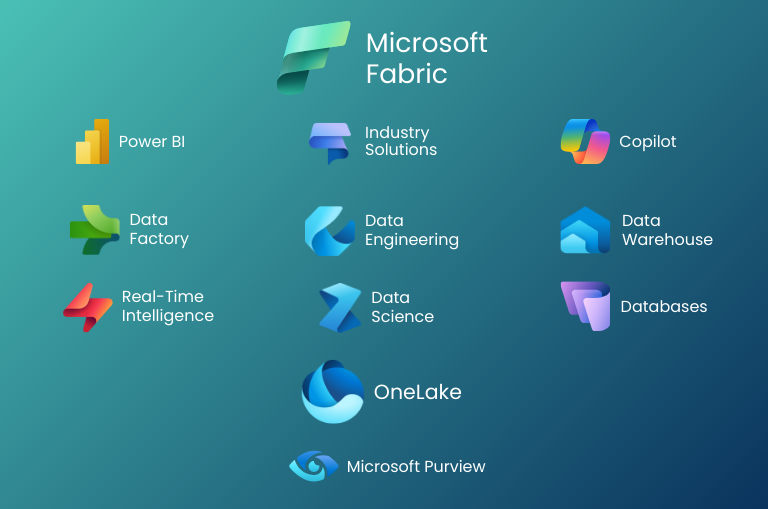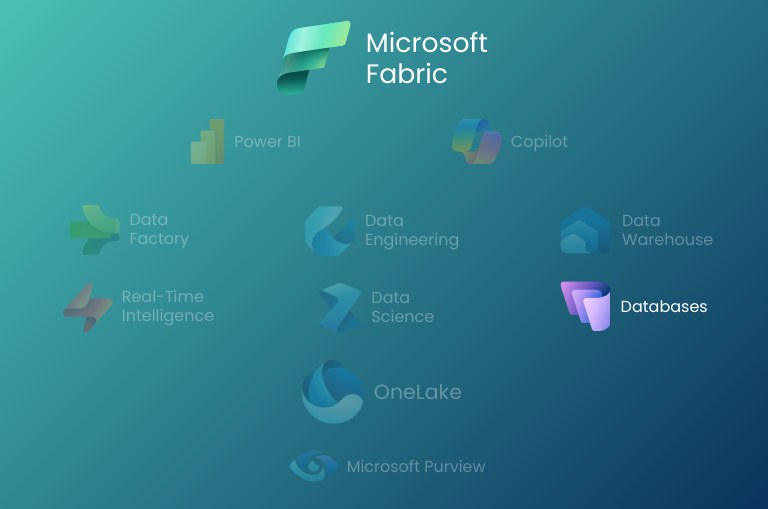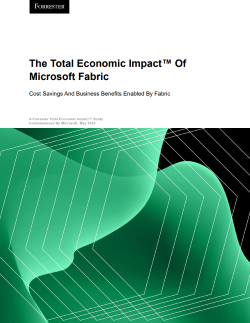What are Databases in Microsoft Fabric?
In today’s dynamic business world, data has become the most critical asset, driving innovation and fact-based decision-making. It powers artificial intelligence (AI) algorithms, opening up new, exciting opportunities for companies. However, the sheer volume of information can be overwhelming.
How to effectively manage this digital ocean? A combination of human vision with powerful tools capable of processing and analysing data in real time is needed.
This is where solutions such as Microsoft Fabric Databases come in, simplifying the storage, integration, and processing of data to support AI development and create breakthrough business applications.
What is Microsoft Fabric?
Microsoft Fabric is a comprehensive, integrated data and analytics platform designed for enterprises seeking a simple yet versatile solution for collecting, processing, and analysing information. The platform operates in the Software as a Service (SaaS) model, ensuring ease of use, high scalability, and security.
The key principle of the platform is the unification of resources and services in one cohesive environment. Instead of integrating solutions from various providers, Microsoft Fabric offers a unified cloud-based technology stack built on Microsoft Azure, which streamlines work for both business teams and IT specialists.
Data in Microsoft Fabric is stored in OneLake, a central repository that eliminates the need to use many often-dispersed data stores. This allows companies to manage access more efficiently, maintain data consistency, and ensure regulatory compliance.
Built-in artificial intelligence (AI) mechanisms help better understand data and use it in Microsoft Azure AI Services and specific applications, from real-time reporting to advanced machine learning modelling available in Microsoft Azure AI Foundry.
One of the most innovative elements of the platform is Microsoft 365 Copilot, an integral part of Fabric. Copilot is a generative artificial intelligence (GenAI) assistant that automates routine tasks, fills in gaps in specialist knowledge, and suggests optimal data operations. As a result, users can create reports, formulate queries, and implement data engineering processes faster without the need to write complex scripts.
Moreover, Copilot analyses the context of the data and tailors suggestions to specific business needs. As a result, organisations using Microsoft Fabric, supported by Microsoft Copilot, gain an integrated environment for efficiently connecting data from various sources such as Microsoft Dynamics 365 Sales, designing advanced analytical pipelines, and leveraging machine learning algorithms as well as ready-made large (LLM) and small models (SLM) in everyday work.
This cohesive platform significantly reduces administrative costs, accelerates the deployment of new projects in Power Platform and Microsoft Copilot Studio, and effectively supports teams at every level in maximising the potential of information.
What applications are included in Microsoft Fabric?
Microsoft Fabric is a suite of services with broad applications throughout the entire data processing and analysis cycle. It offers a unified platform where each component plays a key role in the ecosystem.

This gives companies versatile tools for migration, management, and analysis of data, as well as for creating innovative AI solutions.
- Fabric Data Factory - This is a modern tool for integrating and preparing data from various sources. It allows the automation of ETL/ELT processes, task scheduling, and fast transfer of even gigantic volumes of information to target data warehouses. In addition to a rich library of connectors, Data Factory provides mechanisms functional in AI transformation, such as built-in support for intelligent data flows. Thanks to its simple interface, both experienced programmers and business specialists can quickly create data pipelines without the need to write complicated scripts.
- Fabric Data Engineering - A module created for teams specialising in advanced calculations and data engineering. It offers a Spark cluster-based environment, enabling fast processing of massive datasets and integration with other Fabric components. This fosters the creation of scalable machine learning projects, supported by configurable tools and libraries.
- Fabric Data Warehouse - A high-performance data warehouse designed with scalability and flexibility in mind. It allows the separation of computing resources from storage, enabling users to manage performance and costs independently. It supports the native Delta Lake format and integrates seamlessly with other services.
- Fabric Databases - Facilitate the management of relational and custom data structures in a centralised environment. They allow quick replication of data from various sources and consistent scaling for transactional and analytical applications.
- Fabric Data Science - A module that simplifies the design, training, and deployment of machine learning models. It supports integration with Azure Machine Learning and provides a set of tools that facilitate experiments and model lifecycle management.
- Fabric Real-time Intelligence - Provides instant collection and processing of streaming data, enabling real-time event monitoring and log analysis. This allows companies to respond quickly to dynamically changing business conditions based on current data.
- Fabric Power BI - A well-known and valued tool for visualisation and interactive data analysis. In the Fabric environment, it provides easy access to all resources in OneLake, speeding up the creation of reports and dashboards.
- Copilot in Fabric - Copilot is an AI assistant that supports users in automating tasks related to data transformation, cleaning, and modelling. Its ability to generate suggestions and code significantly accelerates the implementation of new analytical processes and learning how to use the platform.
- Fabric OneLake - A central data repository where all files and tables are collected. Thanks to consistent storage, information can be easily shared across different Fabric moduless and data duplication can be avoided.
- Microsoft Purview - A comprehensive solution for data governance and security. It allows monitoring the flow of information within Fabric and establishing governance and compliance policies.
- Fabric Industry Solutions - Provides dedicated industry-specific data solutions that form a solid foundation for data management, analysis, and key decision-making. These solutions address the specific challenges of different sectors, enabling companies to optimise processes, combine data from many sources, and use advanced analytical tools.
Microsoft Fabric brings all these areas together into a unified data platform, offering the most comprehensive big data analytics platform in the industry. Fabric enables organizations and individuals to transform large and complex data repositories into actionable workflows and business intelligence.
The future and market of cloud databases in unified platforms
Cloud databases are becoming the foundation of unified analytical platforms, combining transactional processing, data warehouses, and AI tools. The market is growing dynamically due to demand for scalability, cost flexibility, and integration with advanced technologies.
-
Transition to the service model (DBaaS): Platforms offer management of infrastructure, security, and updates, allowing companies to focus on data analysis.
-
Hybrid and multi-cloud architectures: 65% of organisations use at least two cloud providers to avoid dependency on a single vendor.
-
Integration of AI/ML: Automatic query optimisation, anomaly detection, and metadata management powered by machine learning.
-
The cloud DBaaS market will reach USD 57.5 billion by 2028, growing at a CAGR of 22% (MarketsandMarkets).
-
73.5% of DBMS spending by 2027 will be on cloud DBPaaS solutions (Gartner).
-
The global “datasphere” will exceed 175 zettabytes by 2025, with a CAGR of 61% since 2018 (IDC).
-
60% of companies are migrating to architectures combining public cloud with local edge infrastructure (HPE).
-
The cost of managing data in the cloud is 30–50% lower than on-premise solutions (arXiv).
The main challenge remains vendor lock-in – 45% of organisations report difficulties in migrating between platforms. The answer lies in open formats (Apache Iceberg) and interoperability standards.
Generative AI is revolutionising data management – algorithms can automatically create optimal database schemas or generate SQL queries from natural language. According to research available on arXiv, AI-powered systems reduce data analysis time by 40%.
Unified platforms also focus on green transformation – cloud databases consume up to 70% less energy than traditional data centres, thanks to dynamic resource allocation.
The cloud database market will grow along with the expansion of AI and IoT. The keys to success are price flexibility, support for real-time processing, and AI-driven automation.
What are Fabric Databases
Microsoft Fabric Databases is a fully integrated component of the Microsoft Fabric platform that enables the creation and management of transactional databases in the Software as a Service (SaaS) model.
With it, there is no need to worry about complex infrastructure, configurations, or coordinated integration of data from various sources. In practice, Fabric Databases is a developer and database administrator-friendly environment, while providing simple mechanisms for processing large volumes of information.

One of the key functions of the platform is the ability to combine data from different systems and synchronise them in one place. Thanks to the “mirroring capability” and OneLake, data can be replicated from external solutions such as Azure SQL Database, Azure Cosmos DB, or Azure Databricks without the need for complex migrations.
This means that companies can have an organised and up-to-date view of their information resources in real time. Fabric Databases is also ready for AI challenges. Together with the Microsoft Copilot for SQL database environment, it offers tools that speed up writing queries and SQL code, as well as automate repetitive tasks. This means that data science teams and data engineers can more quickly transform raw information into ready-to-use machine learning models.
Moreover, thanks to easy integration with other elements of Microsoft Fabric, such as Real-Time Analytics or Power BI, it is possible to create complete data processing workflows – from acquisition, through analysis, to visualisation and deployment in production environments. In the AI context, Fabric Databases provides a stable foundation for training models and data exploration, while built-in security and access management features ensure compliance with organisational guidelines.
This allows focus on creating business value and implementing innovation, rather than on the complexities of infrastructure or complicated data connections from many sources.
Who is Fabric Databases for?
Fabric Databases is for anyone who wants to streamline information processing in a company, regardless of technical proficiency. Developers and architects will appreciate the flexibility of the databases and the ability to prototype new solutions quickly.
Data Science specialists will use the unified environment to train and test models, while business teams will be able to use ready-made real-time analyses.
Moreover, thanks to built-in task automation and integration with Copilot, even people without coding or database administration experience can easily start working with data and improve decision-making processes in the organisation.
How to use Fabric Databases in business?
Fabric Databases can be used in business in many ways to increase operational efficiency and improve decision-making:
-
Cloud data management: Store and share data in the SaaS model without the need for your infrastructure.
-
Integration with existing systems: Replicate data from services such as Azure Cosmos DB, easily connecting it with other sources.
-
Process automation: Create scheduled tasks and workflows to load and transform data every day automatically.
-
AI support: Thanks to Copilot and built-in AI features, you can quickly generate and optimise SQL queries, as well as prepare data for model training.
-
Security and compliance: Manage permissions, ensuring access only to the right people, and use built-in data protection mechanisms.
What are the benefits of using Fabric Databases?
First of all, you gain consistency and a central place to manage all company data. This allows every department – from IT, through marketing, to sales – to base their work on the same up-to-date information.
The ability to easily combine data from many sources helps avoid the “silos” problem and fosters faster decision-making. The SaaS model translates into lower infrastructure maintenance costs.
Automatic scaling means you do not have to worry about sudden increases in workload. Built-in security and access control features help meet compliance requirements, and the ability to work with Copilot makes it easier to speed up daily database-related tasks.
What are the benefits of using Fabric Databases in a company’s AI transformation?
The integration of Fabric Databases with AI processes in a company brings many advantages:
-
Automation and work improvement: With Copilot, you can create and optimise SQL queries in a fraction of the time, speeding up model training.
-
Rapid prototype deployment: The unified database environment allows a smooth transition from idea to a working AI solution.
-
Data centralisation: All resources are available in one place, making it easier to prepare training and testing datasets.
-
Integration with other Fabric modules: The ability to work with services such as Real-Time Analytics or Data Warehouse accelerates the entire data analysis process.
-
Low costs and scalability: Thanks to the SaaS approach, you pay only for usage, and scaling up or down happens automatically.
How do Databases integrate with other Microsoft Fabric modules?
Microsoft Fabric is an ecosystem that includes, among others, Data Factory, Power BI, Real-Time Intelligence, and Data Science. Databases are part of this family of services, providing consistent storage and processing of information within a single SaaS environment.
For example, data collected and cleaned in Data Factory can be easily replicated to Fabric Databases. Then the computing power in Data Science can be used to train machine learning models.
The results can then be visualised in Power BI and shared across the organisation. These operations are simplified thanks to Copilot, which automates and speeds up writing SQL or KQL code. As a result, the entire data flow is fast, secure, and scalable.
Return on investment of implementing the unified Microsoft Fabric data platform
The Forrester report The Total Economic Impact™ Of Microsoft Fabric (TEI) shows that Microsoft Fabric delivers 379% return on investment (ROI) over three years with 9.79 million USD NPV. Analysing a company with revenues of 5 billion USD, Fabric increased data engineer productivity by 25% (1.8 million USD savings), increased business analyst efficiency by 20% (4.8 million USD savings) and generated 3.6 million USD in profits through better decisions.
Infrastructure savings reached 779 thousand USD, and employee retention improved by 8%. The unified platform integrates data engineering, storage, science, and real-time analytics, eliminating silos. The SaaS model and intuitive interface enable data availability across the organisation, supporting data-driven strategies, according to the Forrester TEI study commissioned by Microsoft.
Summary
Microsoft Fabric Databases is a modern approach to data management that fits into the increasingly dynamic AI transformation in companies. Thanks to the centralisation of information and integration with other Microsoft Fabric modules, we gain a complete environment where collected data does not remain in “warehouses” and is not dispersed among various departments.
Instead, it can be quickly combined into a cohesive whole, analysed and ultimately used to automate business processes or create predictive models. Moreover, thanks to Microsoft Copilot and other AI features, even smaller companies without extensive IT teams can benefit from advanced analytics and data processing.
This opens the way to creating new services, optimising costs, and increasing customer satisfaction. The shared cloud also ensures easy scalability – growing workloads will not require costly modernisation of local server rooms.
As a result, Microsoft Fabric Databases becomes a strong foundation for building future-oriented AI solutions. Implementing Microsoft Fabric with Data Warehouse, together with Microsoft Power BI and Microsoft 365 Copilot, creates an integrated ecosystem and data foundation for analytics and AI. Whether a company is just starting its journey in the world of data analysis or needs advanced machine learning capabilities, this tool can significantly accelerate any digital transformation.


